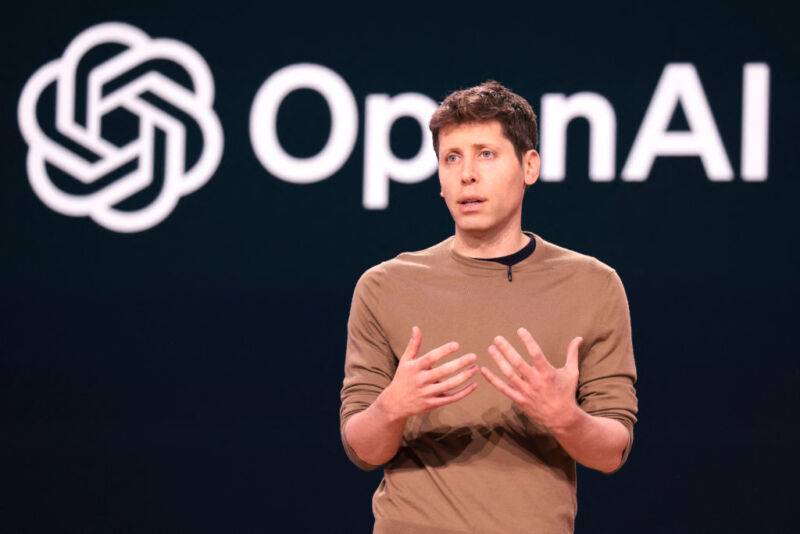
Former and present OpenAI staff obtained a memo this week that the AI firm hopes to finish essentially the most embarrassing scandal that Sam Altman has ever confronted as OpenAI’s CEO.
The memo lastly clarified for workers that OpenAI wouldn’t implement a non-disparagement contract that staff since a minimum of 2019 had been pressured to signal inside every week of termination or else threat dropping their vested fairness. For an OpenAI worker, that might imply dropping hundreds of thousands for expressing even delicate criticism about OpenAI’s work.
You may learn the total memo under in a put up on X (previously Twitter) from Andrew Carr, a former OpenAI worker whose LinkedIn confirms that he left the corporate in 2021.
“I suppose that settles that,” Carr wrote on X.
OpenAI confronted a serious public backlash when Vox revealed the unusually restrictive language within the non-disparagement clause final week after OpenAI co-founder and chief scientist Ilya Sutskever resigned, alongside along with his superalignment workforce co-leader Jan Leike.
As questions swirled concerning these resignations, the previous OpenAI staffers offered little clarification for why they abruptly stop. Sutskever principally wished OpenAI effectively, expressing confidence “that OpenAI will construct AGI that’s each secure and helpful,” whereas Leike solely provided two phrases: “I resigned.”
Amid an explosion of hypothesis about whether or not OpenAI was maybe forcing out staff or doing harmful or reckless AI work, some questioned if OpenAI’s non-disparagement settlement was maintaining staff from warning the general public about what was actually occurring at OpenAI.
In accordance with Vox, staff needed to signal the exit settlement inside every week of quitting or else probably lose hundreds of thousands in vested fairness that might be price greater than their salaries. The acute phrases of the settlement had been “pretty unusual in Silicon Valley,” Vox discovered, permitting OpenAI to successfully censor former staff by requiring that they by no means criticize OpenAI for the remainder of their lives.
“That is on me and one of many few instances I have been genuinely embarrassed operating OpenAI,” Altman posted on X, whereas claiming, “I didn’t know this was occurring and I ought to have.”
Vox reporter Kelsey Piper referred to as Altman’s apology “hole,” noting that Altman had not too long ago signed separation letters that appeared to “complicate” his declare that he was unaware of the cruel phrases. Piper reviewed a whole bunch of pages of leaked OpenAI paperwork and reported that along with financially pressuring staff to rapidly signal exit agreements, OpenAI additionally threatened to dam staff from promoting their fairness.
Even requests for an additional week to evaluate the separation settlement, which might afford the staff extra time to hunt authorized counsel, had been seemingly denied—”as not too long ago as this spring,” Vox discovered.
“We need to be sure to perceive that if you happen to do not signal, it might influence your fairness,” an OpenAI consultant wrote in an electronic mail to 1 departing worker. “That is true for everybody, and we’re simply doing issues by the e book.”
OpenAI Chief Technique Officer Jason Kwon advised Vox that the corporate started reconsidering revising this language a couple of month earlier than the controversy hit.
“We’re sorry for the misery this has brought about nice individuals who have labored arduous for us,” Kwon advised Vox. “We’ve got been working to repair this as rapidly as doable. We are going to work even more durable to be higher.”
Altman sided with OpenAI’s greatest critics, writing on X that the non-disparagement clause “ought to by no means have been one thing we had in any paperwork or communication.”
“Vested fairness is vested fairness, full cease,” Altman wrote.
These long-awaited updates clarify that OpenAI won’t ever claw again vested fairness if staff depart the corporate after which brazenly criticize its work (until each events signal a non-disparagement settlement). Previous to this week, some former staff feared steep monetary retribution for sharing true emotions concerning the firm.
One former worker, Daniel Kokotajlo, publicly posted that he refused to signal the exit settlement, regardless that he had no concept methods to estimate how a lot his vested fairness was price. He guessed it represented “about 85 p.c of my household’s web price.”
And whereas Kokotajlo stated that he wasn’t certain if the sacrifice was price it, he nonetheless felt it was vital to defend his proper to talk up concerning the firm.
“I needed to retain my capacity to criticize the corporate sooner or later,” Kokotajlo wrote.
Even delicate criticism might seemingly price staff, like Kokotajlo, who confirmed that he was leaving the corporate as a result of he was “dropping confidence” that OpenAI “would behave responsibly” when creating generative AI.
In OpenAI’s protection, the corporate confirmed that it had by no means enforced the exit agreements. However now, OpenAI’s spokesperson advised CNBC, OpenAI is backtracking and “making vital updates” to its “departure course of” to eradicate any confusion the prior language brought about.
“We’ve got not and by no means will take away vested fairness, even when folks didn’t signal the departure paperwork,” OpenAI’s spokesperson stated. “We’ll take away non-disparagement clauses from our customary departure paperwork, and we’ll launch former staff from present non-disparagement obligations until the non-disparagement provision was mutual.”
The memo despatched to present and former staff reassured everybody at OpenAI that “no matter whether or not you executed the Settlement, we write to inform you that OpenAI has not canceled, and won’t cancel, any Vested Items.”
“We’re extremely sorry that we’re solely altering this language now; it doesn’t mirror our values or the corporate we need to be,” OpenAI’s spokesperson stated.

